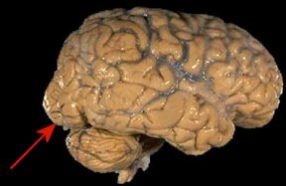Lost Sight, Found Sound
Brain areas devoted to vision can take on other duties following loss of sight.
By Emily Sohn
In some children who go blind, certain parts of the brain that normally control vision appear to switch jobs and focus instead on sound, a new study has found.
 |
|
The human brain’s visual cortex is found at the back of the brain (arrow). |
| NIH |
The study, by researchers at the University of Montreal, involved 7 adults who could see and 12 adults who had lost their vision when they were children. Each participant sat in a room with 16 loudspeakers at different locations. The room was designed so that there were no echoes.
During the experiment, the speakers randomly produced sounds. Participants had to point to where the sounds were coming from. Meanwhile, the researchers monitored blood flow in the brains of the participants to see which brain structures were working during the task.
The results showed that five of the blind participants were very good at pointing to where sounds were coming from. In these people, blood flow increased in the visual cortex—an area at the back of the right side of the brain. This part of the brain is usually associated with vision.
The other seven blind participants showed no increase in activity in the visual cortex. These people didn’t do very well at picking out where sounds were coming from. Now, the researchers are looking at whether these people have gained a heightened sense of touch instead of sound to replace their lost vision.
The scientists say that their study shows how adaptable parts of the brain can be.—E. Sohn
Going Deeper:
Bower, Bruce. 2005. Lost sight, found sound: Visual cortex sees way to acquiring new duties. Science News 167(Jan. 29):67-68. Available at http://www.sciencenews.org/articles/20050129/fob2.asp .
Sohn, Emily. 2004. Hearing better in the dark. Science News for Kids (Oct. 20). Available at http://www.sciencenewsforkids.org/articles/20041020/Note3.asp .
You can learn more about vision, blindness, and the brain’s visual cortex at faculty.washington.edu/chudler/visblind.html and faculty.washington.edu/chudler/brail.html (Neuroscience for Kids).







